
This guide covers Basic Gameplay elements such as Families, Ranks, Assignments, Rackets, Conflicts and Assassinations, Arrests and Trials, Politics, and The Commission.
Contents
Ranks
All credit goes to nakayuma!
The family members under your direct control can be divided into three ranks. At the top is the Don. Next in rank are the Caporegimes, operating on the Borough level. Their subordinate Soldatos occupy the Neighborhoods within.
Promotion
At times, it is necessary to promote family members. Associates can be promoted to Soldatos, and Soldatos can be promoted to Caporegimes. When replacing a Caporegime that’s been killed or sent to prison, their replacement will assume control of any subordinates. The maximum number of each rank is limited by the Power of the Don.
Demotion
Likewise, Soldatos can be demoted back into Associates. This causes their unique properties to be lost forever, even if another Associate is promoted in the future. This can be useful to cycle through Soldatos for ideal Traits.
Don
The Don is head of the family, and as such, is more involved in managing the hierarchy than getting their hands dirty. Their main responsibility is the accumulation of Power, which determines the maximum size of the family. The Loyalty of subordinates is the single most important factor that affects the rate that Power increases. If the Don is replaced by a Caporegime, progress to the next level of Power is lost.
Caporegime
Caporegimes are the middle rank of the family. They are stationed in each Borough, overseeing their subordinate Soldatos and Associates. Their main responsibility is Recruitment. They take a cut of all Profit earned within their assigned Borough, to pay themselves and their subordinates. Adjusting this cut will greatly affect Loyalty.
Soldato
Soldato are the lowest rank of the family. Once assigned to a Neighborhood, they allow the family to invest in Rackets and start Conflicts. Keeping at least one Soldato stationed is required to collect Profit and maintain Rackets.
Associate
Associates are nameless henchmen, recruited by Caporegimes. When a Soldato moves to their assigned Neighborhood, they can borrow Associates for some additional Muscle. You can promote Associates, making them full-fledged members of the family. The maximum number of Associates can be increased through Rackets that generate Recruitment, and Associates will automatically replenish up to that maximum amount.
Assignment
Caporegime and Soldato units must be assigned to a location before they can perform useful actions for the family. In both cases, the unit will move to their assignment at the end of the turn.
Assigning Caporegimes
The first step that most players will take when starting a new game is assigning a Caporegime to a Borough. Doing this enables assignment of the Caporegime’s subordinates to the Neighborhoods within. When a Caporegime is assigned, they apply their Traits to all Neighborhoods within the Borough and collect Recruitment from friendly Rackets that produce it.
Borough
New Shore is divided into five Boroughs, each with a rich history, and several Neighborhoods within. Caporegimes are assigned to each Borough. Though they may not interact directly, it can be useful to know which Borough a family is targeting.
Assigning Soldatos
Soldatos run operations within each Neighborhood. They can be assigned alone, but it’s wise to send them with Associates as backup. Soldatos can only be assigned to Neighborhoods within the Borough that their superior is assigned. Once In a Neighborhood, Soldatos enable Racket investment and other actions. If there are ever no remaining Soldatos in a Neighborhood, all Racket investments will be lost.
Neighborhoods
The Neighborhoods of New Shore are where the action happens. Soldatos fight for control in Conflicts, and illegal activity in the form of Rackets takes place. Each Neighborhood has a different Neighborhood Wealth and Neighborhood Size. Some may also favor or hate a Racket Archetype, though this will not be revealed until the player tries to invest in a racket of that type. The capacity for investment and Muscle is shared between families.
Neighborhood Capacity
Each Neighborhood has limited capacity for Muscle, shared between families. When exceeding this capacity, Rackets no longer produce Profit and Recruitment. Since Rackets have a maintenance cost, this is a bad situation for everyone involved. Staying in an overcapacity Neighborhood tends to make the AI hostile, making them prone to starting Conflicts.

Rackets
Rackets are illegal activities that generate Profit for the family. Certain types will also generate Recruitment, granting Caporegimes additional Associates. Unfortunately, Rackets also attract the attention of police, raising the Heat of the Neighborhood. If a Racket isn’t generating enough Profit, or Heat is rising too rapidly, it can be a good idea to suspend temporarily, or sell it outright.
Racket Potential
Rackets will perform differently in each Neighborhood. Each Racket has an Archetype such as Gambling or Theft. Various Policies and Traits can target these archetypes and affect their potential Profit. Neighborhoods may have a favored or hated Archetype, hinted at in their description. Finally, if the Neighborhood neither favors or hates a Racket, potential will be affected by Neighborhood Wealth and Neighborhood Size.
Racket Investment
Rackets can expand with some extra investment. Not only will the generated Profit and Recruitment increase, but you’ll make progress towards unlocking Racket Perks. Each Neighborhood has limited capacity for investment, and it’s shared between families.

Recruitment
Some Rackets, such as speakeasies, generate Recruitment every turn. The total Recruitment generated in a Borough is divided amongst its Caporegimes. The maximum number of Associates is determined by Recruitment. When Associates are killed or promoted, they’ll slowly replenish each turn, until reaching the maximum.
Heat
Heat builds up in a Neighborhood with Racket activity. Investing in Rackets also generates a small amount of Heat. In most cases, a Racket will generate an amount of Heat that decreases after several turns, as the Neighborhood becomes acclimated to the crime. The exceptions are money laundering, which removes Heat, and kidnapping, which generates a large fixed amount, and never decreases over time.
Youtuber “Knee Pit Gaming” also did a Guide on Rackets.
Conflicts and Assassination
There are no allies in New Shore, and wherever there’s a conflict of interest, there’s a risk of violence breaking out. There are two main ways that families can kill opposing units.
Conflicts
When a Conflict breaks out, the Muscle of the opposing families will battle. Fighting will continue until both sides decide to defend, or one side no longer has any Muscle left. If the Conflict ends by one side killing the last remaining enemy Soldato, they’ll earn an Interrogation. Conflicts generate Heat each turn, so pick your battles carefully. Additionally, a family that starts a conflict will have a slight advantage on the first turn, assuming the other family didn’t attack at the same time.
Assassinations
Collecting info on the enemy family through Interrogations lets you reveal enemy units. With enough Interrogations, you can order a hit. The chance of a successful assassination increases as you collect more Interrogations past the minimum amount, and all Interrogations will be used up. If your hitman fails, your identity is revealed to the enemy.
Arrest and Trial
As Heat rises, the likelihood of an arrest rises as well. The police of New Shore are more concerned with appearances than justice, so any Soldato in the Neighborhood is fair game for an arrest. It doesn’t matter if another family’s Racket is generating the Heat. After an arrest, the public will feel more secure, reducing Heat by a large amount. Leaving the Neighborhood, suspending Rackets, and using political favors are all good ways to avoid arrest.
Jail
Soldato go to jail when arrested, and face trial after a few turns. The likelihood of a guilty verdict varies depending on the crime’s severity. If the accused has low Loyalty, they’ll be tempted to sing to the authorities, landing their superior in jail as well. When a Soldato sings, their Caporegime will go to jail. When a Caporegime sings, the Don will go to jail. This is one of the few ways that a Don can be removed from the family.
Loyalty
Loyalty is the bond between a unit and their family. Caporegimes will feel a strong sense of Loyalty so long as they get a decent cut of the Profit and succeed in Recruitment efforts. Their Loyalty will spread to subordinate Soldatos as well. Loyalty also affects the rate at which the Don accumulates Power.
Politics
There are four main seats in New Shore’s city politics. The Mayor, the Police Chief, the District Attorney, and the Judge. Each of these political figures implements Policies with a variety of effects. Each time you start a campaign in New Shore, it’s worth checking out which Policies are active.

Politics Tab

Political Favors and Bribing
Each figure has several favors available. Using these favors costs Influence, which is earned through bribes. You can earn up to 100 Influence with a figure through bribes, though it will decay by 2 every turn that you have not bribed that figure. Continued bribing by multiple players will drive up the cost of future bribes. After enough turns without bribes, the cost will begin to fall back to the baseline amount of $25,000. After making use of a favor, there is a cooldown until you can interact with that figure again.

The Commission
There are crime families besides the ones that operate in the city of New Shore. Every so often, all the big names in crime hold a meeting called “The Commission”, where the Don of each family decides on Policies. Each of the 5 major families occupying New Shore gets a vote, as well as each of the minor families from across the country. Minor families will always mirror the vote of the major family that meets a certain condition. In other words, you can gain additional votes by beating the other families at certain tasks.

Commission Vote
The Commission votes every 24 turns. Two Policies are determined after each Commission ranking period. The first Commission Policy has drastic effects, such as raising profit for all Rackets, reducing Heat generation, or making bribes more effective. The Commission Rule on the other hand, only influences the next Commission voting period. It forbids a certain action, such as starting a Conflict, or ordering an assassination.
Families
There are 5 families operating in New Shore, and each has its own background, as well as a signature Trait.

Bogiana Family
A wealthy family that runs like a big business. They’ve established deep ties with the politicians of New Shore, and specialize in high-end rackets. They often take their success for granted, leaving their guard down: a key weakness that is exploited by other families.
Their signature Trait is Earner:
- Soldato are more powerful in neighborhoods with existing friendly investments.
- Caporegimes allow for bigger investments than other families.
- Don increases profits for each additional racket type that the family has invested in.
Benny Bogiana
For the don of the Bogianas, crime is an investment like any other… and he certainly has a diverse portfolio. When people are open about what they want, and will pay any price to get it, is that not the most “honest” business of all? Maybe what he supplies to New Shore is less than ethical, but the never-ending demand is his vindication.
Calessi Family
A family that is known for its code of honor and respectable operation (for a crime family, at least). Their strategy can be described as “strength in numbers”, and they have a growing network of associates throughout the city. They traditionally have had the strongest reputation with the Commission out of the five families.
Their signature Trait is Respected:
- Soldato can bring more associates as backup into neighborhoods.
- Caporegimes accumulate associates more quickly.
- Don has a chance of earning an extra vote when The Commission meets.
Charlie Calessi
The youngest of the five dons. The assassination of Charlie’s father left him with big shoes to fill. While he still has much to prove, he shows signs of being a natural leader, and easily understands what motivates people. His straightforward style is often confused for naivety. As far as he’s concerned, there’s no need to mince words with an army by your side.
Donano Family
A mysterious family that prefers to stay out of sight and out of trouble. They prefer not to get involved in conflicts, but that shouldn’t be mistaken for pacifism. Their influence on city politics and the media should not be underestimated. If you wrong them, you’ll find yourself with the whole city turned against you.
Their signature Trait is Covert:
- Soldato are more powerful in neighborhoods with low heat (police presence and attention).
- Caporegimes negate heat generation as long as it remains low.
- Don is more effective at bribing political figures to earn favors.
Dante Donano
Soft-spoken and unassuming, Dante doesn’t give the impression of being a criminal, let alone a mafia boss. The Donanos are the ones really pulling the strings in New Shore, and the fewer who know that, the better. He’s woven a web of blackmail, deception, and various other contingency plans to keep his family’s unsavory practices out of the limelight.
Junio Family
A boisterous family that is largely comprised of immigrants from the old country who settled in 1890s Fordham. They specialize in low-end rackets that don’t take much time or investment. They seem to find profits in places other families would deem a waste of time. They are the ever-present underdogs of New Shore.
Their signature Trait is Enforcer:
- Soldato are more powerful in neighborhoods without friendly investments.
- Caporegimes negate profit penalty in neighborhoods that are overcapacity.
- Don increases profits based on number of occupied neighborhoods.
Jacopo Junio
The Junios often seem less like an organized crime syndicate, and more like a family bickering at the dinner table. Jacopo just happens to be the one who can yell the loudest. He wants the Junios to be more than “just another nuisance”, and is constantly meddling in the affairs of the other families. Whether he has a master plan, or is just poking the hornet’s nest, is anyone’s guess.
Rocca Family
A dangerous family that has no qualms about engaging in high-risk rackets and killing those who get in their way. The Rocca family faces perpetual inner turmoil, but no one can deny their influence over the city. Nearly everyone knows someone who fell victim to the senseless violence of the Rocca family’s machinations.
Their signature Trait is Vengeful:
- Soldato become more powerful after interrogating enemies.
- Caporegimes collect a portion of destroyed enemy investments as profit.
- Don earns interrogations after an enemy assassination attempt, and spends 1 less interrogation on own assassinations.
Roberto Rocca
The most hated man in New Shore, whose name is spoken in whispers even by politicians. There are plenty of rumors about his sudden rise to power within the Rocca family. He’s known for holding grudges when someone harms his subordinates, though one could hardly call them “life-long”, given the swift enacting of his revenge.

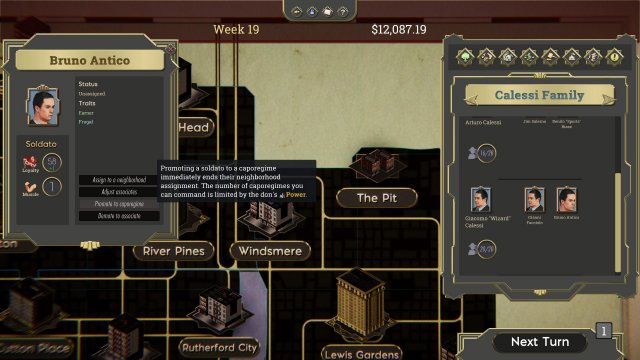
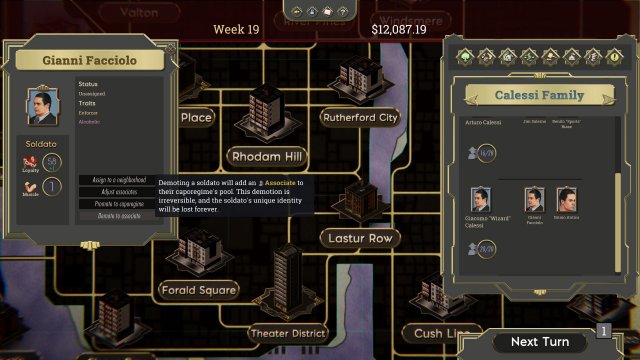
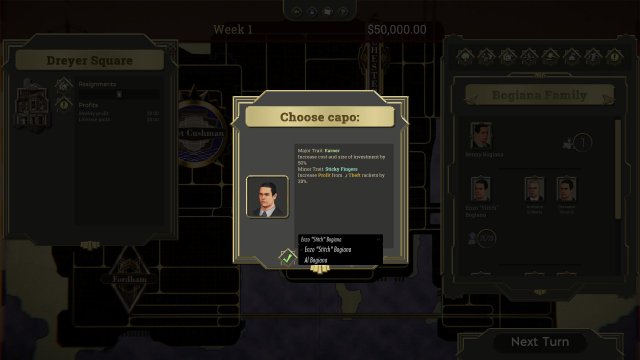



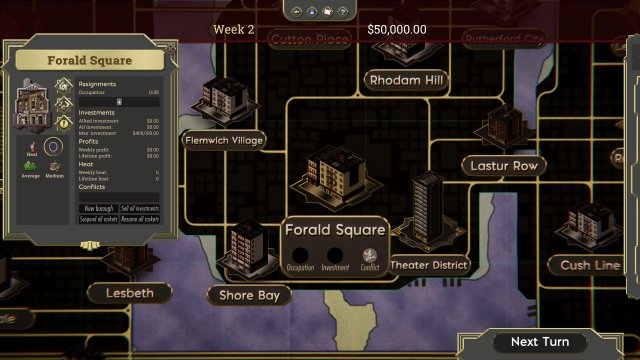
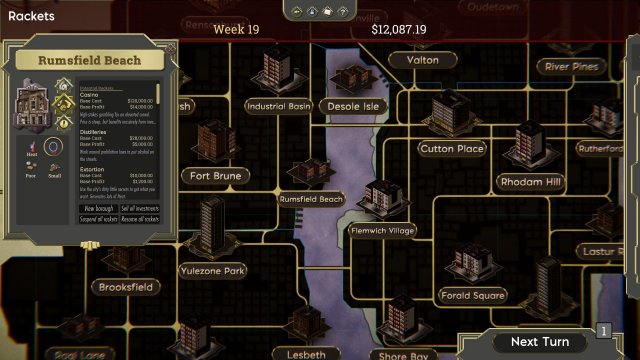
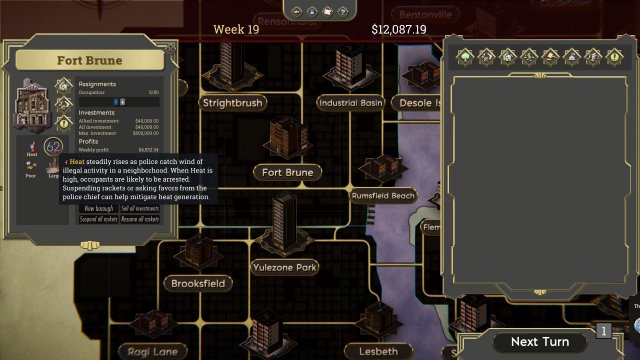
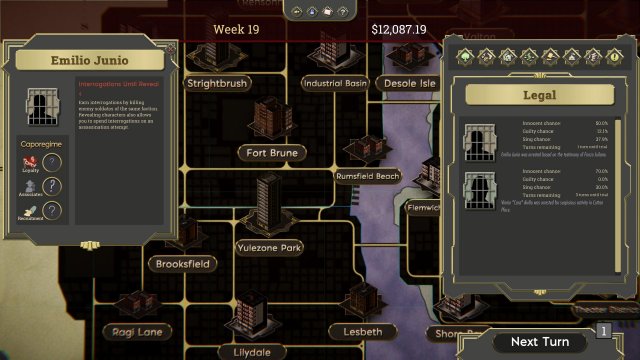

Be the first to comment